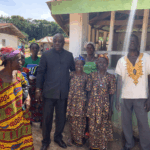Dr. Betty Holley, Contributing Writer
Over the last decade, hurricanes have intensified, wildfires have burned stronger, and heat waves have baked our cities. These events can only get worse in the next decades. Unfortunately, most faith communities are not ready for these climate-driven disasters. The Intergovernmental Panel on Climate Change (IPCC) released its report on April 4, 2022, stating emphatically that the evidence is clear. The climate crisis has arrived!
The IPCC is the United Nations’ body for assessing the science related to climate change, established in 1988 to provide political leaders with periodic scientific assessments concerning climate change, its implications, and risks, as well as, to put forward adaptation and mitigation strategies. Thousands of people all over the world contribute to the work of the IPCC. The IPCC assessments provide governments, at all levels, all over the world, with scientific information that they can use to develop climate policies. They tell us that to prevent the worst effects of climate change on our local and global neighbors, we must make unprecedented changes in the next decade.
Upon reflection on the scriptural passage found in Genesis 6:16-18 and 21, it seems odd that the writer of Genesis chooses to include God’s carpentry measurements in a story with as epic proportions as Noah and the ark. What does it matter that the ark had to be constructed using cypress wood to very precise specifications? What does it matter that the inside and outside had to be covered with pitch? God in God’s awesomeness needed Noah, his wife, and three sons to “weather the storm.” God in God’s awesomeness needed the two of every kind of animal to be able to “weather the storm.” God, in God’s awesomeness, needed the plants to be used to feed Noah’s family and all the animals for an entire year, or whenever the rain stopped, to “weather the storm.”
In the passage, God directed Noah to use cypress wood because this type of wood would not rot and was waterproof. Today, we use cypress wood to build caskets, bridges, stadium seats, railroad ties, ships, and other things that need to be able to weather storms. God directed Noah to cover everything, inside and outside of the ark, with the solution- pitch to make sure the ark was waterproof to be able to weather the storm. God may be revealed through this passage that the way we build our structures and the materials used to build them matter, especially with all the floods we are having in this 21st century. In the face of an oncoming flood, Noah and his ark played the role of a shepherd, guiding God’s people and God’s creation through a transformation into a new kind of community. In the transformation, the building of the ark was not an afterthought but integral to the success of the mission. Without a structurally-sound ark with enough space and facilities for all the creatures, the kind of transformation that occurred through the ark would have been impossible. God needed everything in the ark to be able to weather the flood to enable the presence of future generations of humankind and other kinds on earth at this very moment. The climate crisis presents disasters that will challenge, threaten, endanger, and transform communities around the world. Yet, churches can become arks of resilience in the face of these disasters, preparing our buildings, like Noah prepared the ark. The physical structure of our buildings indeed matter-always, but especially now.
We need to become like Noah and his use of pitch, symbolically, spreading the word about the climate crisis inside and out of every place where God’s people gather. We must waterproof everyone and everything we meet and greet to enable people to weather the storm of climate change. Who will you help weather the storm of climate change?





